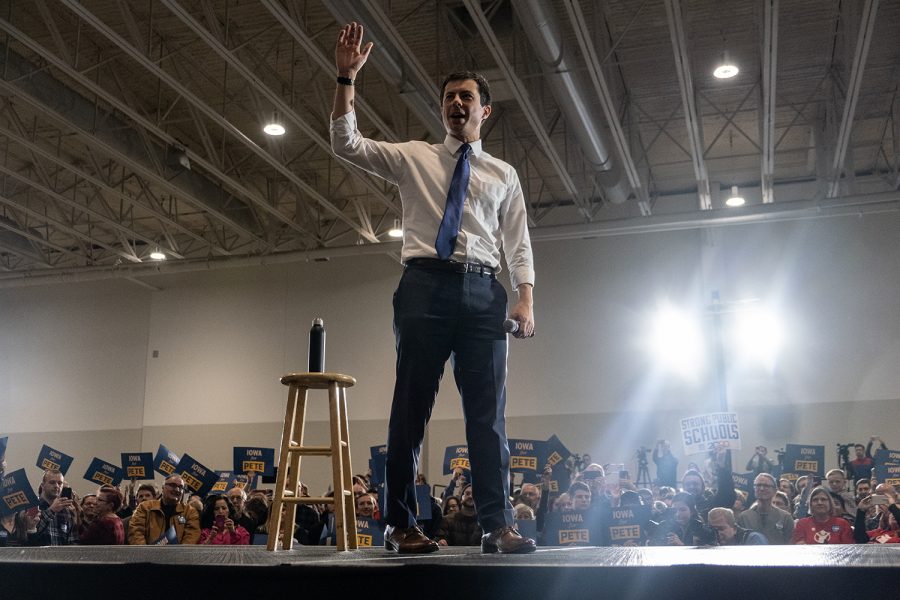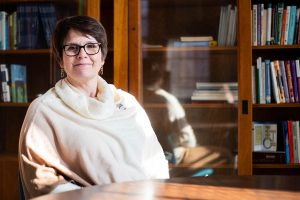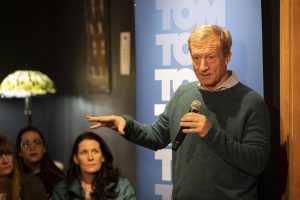Pete Buttigieg pitches country unity amid scrutiny over private-sector work
Drawing over 2,000 people at a rally in Coralville, presidential hopeful Pete Buttigieg discussed his plans to bring America together around shared values. Buttigieg has faced increasing scrutiny as he climbs polls in early presidential selection states.
South Bend, Indiana Mayor Pete Buttigieg takes the stage during a town hall at the Coralville Marriott on Sunday, December 8, 2019. Mayor Buttigieg spoke to a crowd of over 2,000 people at the event.
December 8, 2019
South Bend, Indiana, Mayor Pete Buttigieg drew his biggest Johnson County crowd to date in his first visit since his rise to the top of the latest Iowa poll, amid new controversies and shots by fellow Democratic-nomination candidates.
Over 2,000 people packed the Marriott Conference Center in Coralville on Sunday. At the town hall-style event, Buttigieg spoke for about 15 minutes and fielded questions for about 30 minutes.
Buttigieg has seen a rise in Iowa and other early voting state polling. Buttigieg led the November Des Moines Register/CNN/Mediacom Iowa Poll with 25 percent of poll respondents indicating him as their first choice for the Democratic nomination.
He jumped past contenders Sen. Bernie Sanders, I-Vt., Sen Elizabeth Warren, D-Mass., and former Vice President Joe Biden, who each pulled about 15 percent support in the poll.
Buttigieg stuck to familiar talking points during his speech, talking about uniting the country and returning ideas such as patriotism, freedom, and Christian values to the Democratic Party.
Buttigieg pointed to issues such as climate change and gun violence, saying the next president will have to bridge the partisan gap in order to bring Americans together on these issues.
“The roadmap is to follow the values that we share as Americans,” he said. “Values that do not belong to one political party, and if you take them seriously, lead us in a progressive direction.”
The questions, which were submitted by audience members and screened by campaign staff, covered a range of topics including private prisons, gun control, voting rights, and President Trump’s judicial appointees.
Buttigieg has received criticism as he’s risen in public opinion polls, most recently around his work with McKinsey & Company, a global consulting firm. He worked with the firm for two and a half years after graduating college in 2007.
Calls for Buttigieg to disclose his clients at McKinsey have come after ProPublica and The New York Times reported the firm had worked with the Trump administration to organize its immigration policies. He wrote in a Medium post on Dec. 6 that he was unable to reveal his clients at McKinsey because of confidentiality agreements that the firm would not release him from.
“I never worked on a project inconsistent with my values,” he wrote. “And if asked to do so, I would have left the firm rather than participate.”
Buttigieg has billed himself as a transparent candidate, inviting journalists on marathon on-the-record bus tours around early-voting states, holding two in Iowa.
University of Iowa student Jacob Wendell, 18, who plans to caucus for Buttigieg, said he isn’t concerned about Buttigieg’s work with McKinsey, and he said he doesn’t think Buttigieg’s supporters care too much about it.
“I did read his statement about it, and I thought what he said made sense, and that really, his hands are kind of tied in that situation,” Wendell said.
Solon resident Torben Platt, 61, said the questions around McKinsey were on his mind, but it wasn’t a primary issue for him. Platt said he’s unsure who he’s going to caucus for, but Buttigieg is someone he’s leaning toward.
“I don’t know what’s real and what isn’t, but it seems to me he should come forth and say exactly what he did,” he said. “Donald Trump doesn’t show his taxes, so he’s already done more in that regard.”






